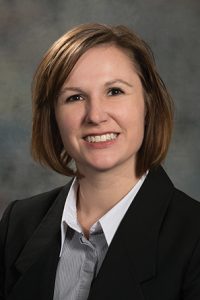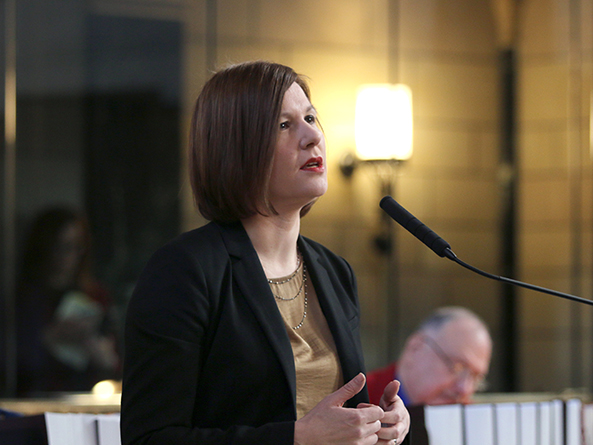County levy authority for deficient bridges stalls
A bill intended to give Nebraska counties more options for bridge repair stalled on general file Feb. 10.

LB267, sponsored by Lincoln Sen. Kate Bolz, would expand the allowable use of funds under a county’s existing tax levy bonding authority to include county-owned bridges that are deemed structurally deficient or “scour critical” according to state Department of Transportation standards.
Scour critical is a term used to describe bridge piers and abutment foundations that are unstable due to scour—or removal—of material around the bridge pier or abutment foundations.
The bill would require that counties repair, retrofit, reconstruct or replace any county-owned bridge that has been deemed deficient by state DOT standards.
Levy authority could be used if a county has no bonded indebtedness payable from its general fund levy and an annual levy could not exceed five and two-tenths cents on each $100 of taxable value of all the taxable property of the county.
Bolz said existing bonding authority can be used for courthouses, jails and other county buildings and that her bill simply would expand that authority to address an urgent need for bridge repair in many Nebraska counties.
“Bridges are critical transportation infrastructure, especially when [counties] are responding to an emergency situation [and are] protecting the safety of the public and protecting important routes for farm products and other goods,” she said.
Thurston Sen. Joni Albrecht opposed the bill, saying it would eliminate voter approval for bonding projects.
“Counties can already issue bonds for bridge repair and construction with a vote of the people,” she said. “LB267 [exists] solely to eliminate the voice of those paying for these projects and allows the county boards to circumvent the people.”
Gretna Sen. Andrew La Grone also spoke in opposition to LB267. Counties should focus on using existing resources for critical infrastructure projects, he said, rather than seeking out additional ways to spend tax dollars. In addition, he said, counties could—under existing law—hold special elections to gain bonding authority for infrastructure repair if more flexibility to react to an emergency situation is needed.
Sen. Matt Hansen of Lincoln questioned that solution. Holding a special election every time a bond is needed for bridge repair would not be cost effective, he said, adding that a special election in Lancaster County would cost $350,000.
“That does not strike me as a realistic or sensible [option],” Hansen said.
Bolz acknowledged that counties have a responsibility to maintain bridges and other infrastructure and said they often struggle to manage competing priorities. Allowing greater bonding authority flexibility would be fiscally responsible, she said, because it would allow counties to take advantage of low interest rates.
“Because of the time frame that a number of our bridges were built, a lot of those bridges are wearing out now—all of the checks are coming due now—and that can be really hard for a county commission to manage when you have bridges deteriorating all at once,” Bolz said.
Plymouth Sen. Tom Brandt spoke in support of LB267. He said concerns regarding counties using levy authority without a vote of the people are overstated. County board members are elected, he said, and would have to face voters if they used their authority unwisely.
“Last time I checked, we’re a representative democracy,” Brandt said. “Counties across Nebraska would benefit from additional resources to assist them in recovering from natural disasters.”
A pending Government, Military and Veterans Affairs Committee amendment would limit the levy authority to cases when a county board declares an emergency and either the president of the United States has declared a disaster or the bridge is designated as scour critical or structurally deficient under DOT standards.
The amendment also would allow levy authority for bridge repair only with the approval of two-thirds of the county board.
After three hours of debate spanning several days, the Legislature adjourned for the day before taking any votes on the bill or the amendment. Per a practice implemented last year by Speaker Jim Scheer of Norfolk, the sponsor of a bill that is facing a potential filibuster must demonstrate sufficient support for a cloture motion before the measure will be scheduled for additional debate.


